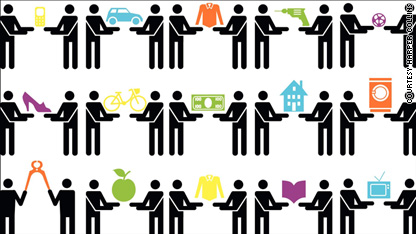Our collaborative consumption rock-star recently sat down with Kyra Choucroun of SustainAbility. The interview, full article and video available at the link in the bottom of this post, bounced between issues faced by collaborative consumption - including:
- How do large corporations and brands fit into the growth of collaborative consumption businesses?
- Where do consumers in developing countries fit into the collaborative consumption movement?
- When do we cross the line and begin to rent or access too much of our lives and should retain individuality and ownership?
 |
| Source: CollaborativeConsumption.com from the What's Mine is Yours book cover |
I'd like to focus on the first question specifically. However, I encourage readers to watch the entire video. Ms. Botsman had very interesting comments about larger brands and the collaborative consumption trend, which can be found from 0:00 to 2:55.
On the large traditional brands evolving role...
"A lot of what makes these (collaborative consumption businesses) attractive is the smallness or uniqueness. That they are operating outside of the big traditional incumbents. But you actually need the big incumbents to get involved because that's how you get to critical mass."
On the staying power of this trend...
"There is massive cultural shift going on. Our relationship to stuff is far less physical than any other previous generation... The line between what's mine and yours is very blurry. If you try to shut your ears and eyes, it's not going to go away. This a very deep social trend. And the other thing is that this is a very massive opportunity."
In the coming months, some large auto manufacturers are beginning to adopt the carsharing model - including BMW, Daimler and Peugeot. However, in many sectors, traditional companies are stuck in a linear consumer model - source raw materials, manufacturer, sell at retail, use, and waste. The collaborative consumption trend jumps into the equation somewhere in the middle and significantly changes this linear model. When a large company, for example a retailer like Home Depot, begins to take notice of companies like Ecomodo or NeighborGoods, what will the reaction be? These models cannibalize sales of power tools significantly. How will Home Depot react to this and begin to rethink what the real value it provides to its customers? Not to be cliché by using my own blog title, but the light bulb moment is when Home Depot sees that access trumps ownership.
UPDATE (fixed broken link): Link to VIDEO and article from Kyra Choucroun at SustainAbility.
Congratulations for your work on this blog that I discovered very recently. I ll keep an eye on it :)
ReplyDeleteThe link to SustainAbility page seems to be broken on the article, I think it should be http://www.sustainability.com/blog/video-interview-rachel-botsman-on-the-rise-of-collaborative-consumption
Albert.
Thank you for the great compliment and the correction on the link!
ReplyDelete